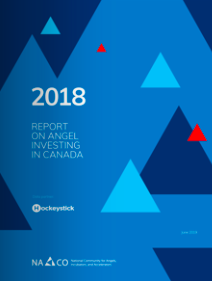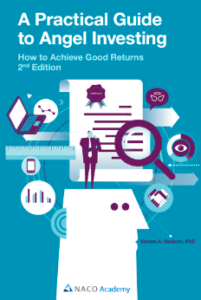FOR EDUCATORS
How to Work with Angels
Early-stage Angel Investors are clearly a critical component of a successful university’s entrepreneurship eco-system providing money, mentorship and legitimacy. But universities can also become a critical component of the Angel Investor eco-system itself.
 At TMEI, this effort was led by Dan Mothersill, Co-Founder and President of Canada’s National Angel Capital Organization (NACO) and Distinguished Visiting Professor and Chaplain at TMU. As a result of his vision and energy, over 20 TMU faculty, students and alumni have directly contributed to Canada’s world-class Angel Investor eco-system. TMEI launched the TorontoMet Angel Network, created the Dobson Micro-Financing Seed Venture Fund, held NACO investment summits, ran Angel conferences, conducted Angel surveys, wrote and published books and reports, created on-line learning platforms, structured the NACO Angel Academy and helped obtain government grants and research programs.
At TMEI, this effort was led by Dan Mothersill, Co-Founder and President of Canada’s National Angel Capital Organization (NACO) and Distinguished Visiting Professor and Chaplain at TMU. As a result of his vision and energy, over 20 TMU faculty, students and alumni have directly contributed to Canada’s world-class Angel Investor eco-system. TMEI launched the TorontoMet Angel Network, created the Dobson Micro-Financing Seed Venture Fund, held NACO investment summits, ran Angel conferences, conducted Angel surveys, wrote and published books and reports, created on-line learning platforms, structured the NACO Angel Academy and helped obtain government grants and research programs.
Mothersill (2007) “Age of the Angel: Best Practices for Angel Groups and Investors” was Dan’s Magnum Opus user’s manual for how to start, manage, finance and grow Angel Groups. The book was based on starting and growing over 20 Angel Groups across Canada and comparing with best practices worldwide. It included chapters from across Canada on how to start and manage an Angel Group, how to find and convince Angels to join, how to find good investment deal flow, and how to manage the investment process itself. It included best practise copies of term sheets, shareholder agreements, NDAs, subscription agreements, due diligence binders, option agreements and other legal best practices.
Gedeon (2007), “Valuing Early Stage Company Angel Investments” provides the foundational methods for determining the valuation of pre-revenue or early-stage companies. By helping both Angels and entrepreneurs use relatively objective standards for company valuation, this article helps both sides of the deal find common ground for striking a deal. This methodology later became the basis for the NACO Angel Academy Valuation training module that teaches Angels how to determine a company’s valuation.
Gedeon (2007), “Negotiating Angel Investment Term Sheets” applies the principle-based negotiation framework to Angel investments, identifies the most common term sheet conditions in early stage financing and identifies integrative, distributive and mutual agreement terms and generally-accepted ranges. Valliere, Rice & Gedeon (2006) “What matters when entrepreneurs choose their venture capitalists” looks at the decision-making process from the entrepreneurs’ side of the negotiation and demonstrates that they tend to focus primarily on certain term sheet conditions (like valuation and ownership control) over other terms (like quality of the investor and overall amount of money). These frameworks became the basis of a NACO workshop for many years and eventually a NACO Angel Academy Negotiation training module that teaches Angels how to negotiate investments, liquidity events and acquisitions.
Gedeon (2010) “Due Diligence Process for Evaluating the Intangible Assets of an Investee Company (The Role of Trust, Ethics, Character and Competence)” demonstrates that the primary value of a pre-revenue company is almost entirely based on intangible, non-financial assets. One of the goals of the due diligence process is to assess these assets which can be categorized as Human Capital, Intellectual Capital, Social (or Relationship) Capital and Psychological Capital – the ability to motivate and engage the employees of a startup company. This article was later modified and published in the academic literature as Gedeon (2011) “Trust, Ethics, Character and Competence in Angel Investing”.
Gedeon (2015) “How to Measure and Build Intra- and Inter-Organizational Trust” Special issue on “The Value of Trust in Entrepreneurship” focusses on the role of trust and provides a more comprehensive and theoretically based model of trust within organizations to create the Framework for Trust Management. This framework is used to propose a scale for measuring trust within organizations. Tajzadeh (2017) “Exploring the Framework for Trust Management Model for Interpersonal Trust” (MScM Thesis supervised by Gedeon) later assessed the validity and reliability of this scale and refined the specific questions included in the questionnaire.
 Ryerson faculty have been deeply involved in helping survey, understand and promote the Angel Investing eco-system in Canada. Gedeon & Watson (2010) “Assessment of the Activity Level and Trends of Angel Investors in Ontario” was the first comprehensive analysis of Angel investing within Ontario and was used to establish a number of provincial government programs aimed at supporting this important financial asset class. Grant, Padmanaban & El-Kebbi (2018) “The Early Investment Ecosystem for Start-ups in Canada, a Preliminary Study” extended this methodology across all of Canada and Grant, Croteau & Aziz (2019) “The Survival Rate of Startups Funded by Angel Investors” broadened the analysis to include not only the amount and number of Angel Investments, but also the impact on the success of their investee startups. The NACO Annual Report on Angel Investing in Canada is now one of the world’s premier demonstrations of the positive economic impact of Angel Investing.
Ryerson faculty have been deeply involved in helping survey, understand and promote the Angel Investing eco-system in Canada. Gedeon & Watson (2010) “Assessment of the Activity Level and Trends of Angel Investors in Ontario” was the first comprehensive analysis of Angel investing within Ontario and was used to establish a number of provincial government programs aimed at supporting this important financial asset class. Grant, Padmanaban & El-Kebbi (2018) “The Early Investment Ecosystem for Start-ups in Canada, a Preliminary Study” extended this methodology across all of Canada and Grant, Croteau & Aziz (2019) “The Survival Rate of Startups Funded by Angel Investors” broadened the analysis to include not only the amount and number of Angel Investments, but also the impact on the success of their investee startups. The NACO Annual Report on Angel Investing in Canada is now one of the world’s premier demonstrations of the positive economic impact of Angel Investing.
 Gedeon (2016 & 2017) “A Practical Guide to Angel Investing: How to Achieve Good Investment Returns” (1st and 2nd Editions) provides the current state-of-the-art on how to manage an Angel Investment portfolio, set targets, gain insight into investee companies, negotiate, value and structure a deal. It then focuses on what Angels can do to add value to their investee companies with governance, coaching/mentoring, networking, and creating good exits. The book includes extensive references, data-backed recommendations (e.g. for the size and structure of your portfolio and how much time to put into due diligence, negotiations, coaching and finding exits) and contributions from over thirty of Canada’s leading Angels and Angel experts.
Gedeon (2016 & 2017) “A Practical Guide to Angel Investing: How to Achieve Good Investment Returns” (1st and 2nd Editions) provides the current state-of-the-art on how to manage an Angel Investment portfolio, set targets, gain insight into investee companies, negotiate, value and structure a deal. It then focuses on what Angels can do to add value to their investee companies with governance, coaching/mentoring, networking, and creating good exits. The book includes extensive references, data-backed recommendations (e.g. for the size and structure of your portfolio and how much time to put into due diligence, negotiations, coaching and finding exits) and contributions from over thirty of Canada’s leading Angels and Angel experts.
“At a time when Angel investing is becoming the most important early-stage funding, this book is a practical and comprehensive way to decode this unique world of investing. Steve Gedeon has provided the quintessential resource for anyone wanting to crack the Angel code with a clear, step-by-step guide for prospective Angels and entrepreneurs alike.” – Randall Howard, Managing Partner, Verdexus
“For first-time Angels, this is a must-read; to seasoned angels, a great refresher… This is the type of education that will help continue to grow the Angel asset class.” – Robert Brouillette, Past Chair, Anges Quebec & Director, Anges Quebec Capital
“Steven Gedeon’s book is a must read for Angel Investors everywhere. It contains everything you need to know in order to participate in the Angel Eco-system which has become a global asset class…” – Parm Gill, Managing Partner, The Gill Group
Click here for an on-line free version of Gedeon (2016 & 2017) “A Practical Guide to Angel Investing: How to Achieve Good Investment Returns” (1st and 2nd Editions)